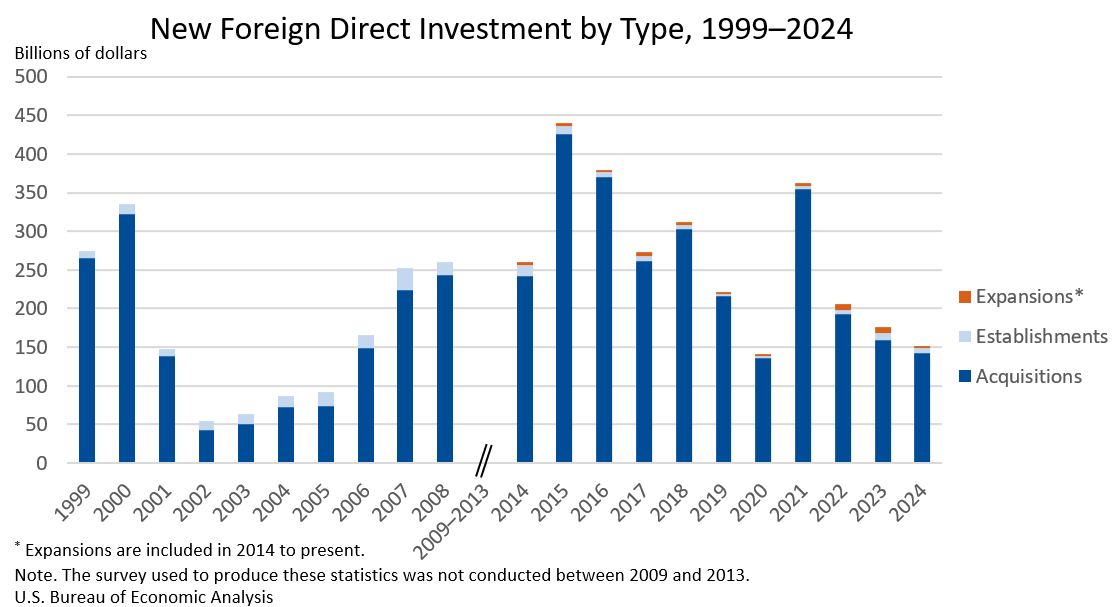Bureau of Economic Analysis
New Foreign Direct Investment in the United States, 2024
Expenditures by foreign direct investors to acquire, establish, or expand U.S. businesses totaled $151.0 billion in 2024, according to preliminary statistics released today by the U.S. Bureau of Economic Analysis. Expenditures decreased $24.9 billion, or 14.2 percent, from $176.0 billion (revised) in 2023 and were below the annual average of $277.2 billion for 2014–2023. As in previous years, acquisitions of existing U.S. businesses accounted for most of the expenditures.
Principal Federal Economic Indicators
Noteworthy
- 2025 News Release Schedule
- Innovation at BEA
- 2025 Annual Updates
- New! Services Trade Data for More Countries
- Data Tool: Trade in Value Added
- Distribution of State Personal Income
- Updated: RIMS II Regional Multipliers
- Arts and Culture
- Space Economy
- FDI Now in State BEARFACTS
- Quick Guide: Price Indexes
The Latest
Real Consumer Spending Rose in March
Personal income increased less than 0.1 percent in March after rising 0.4 percent in February. Wages and salaries, the largest component of personal income, rose 0.2 percent in March after rising 0.3 percent in February.
Current-dollar disposable personal income (DPI), after-tax income, increased less than 0.1 percent in March after rising 0.5 percent in February.
Real DPI, income adjusted for taxes and…
Personal Income and Outlays, March 2015
Personal income increased $6.2 billion, or less than 0.1 percent, and disposable personal income (DPI) increased $1.6 billion, or less than 0.1 percent, in March, according to the Bureau of Economic Analysis. Personal consumption expenditures (PCE) increased $53.4 billion, or 0.4 percent.
GDP Up Slightly in First Quarter
Real gross domestic product (GDP) increased 0.2 percent in the first quarter of 2015, according to the “advance” estimate released by the Bureau of Economic Analysis. In the fourth quarter of 2014, real GDP increased 2.2 percent. In the first quarter, the dollar strengthened against major currencies, imports and exports were delayed because of labor disputes in key ports, energy prices declined, and several regions experienced severe weather…
Gross Domestic Product, 1st quarter 2015 (advance estimate)
Real gross domestic product -- the value of the production of goods and services in the United States, adjusted for price changes -- increased at an annual rate of 0.2 percent in the first quarter of 2015, according to the "advance" estimate released by the Bureau of Economic Analysis.
Nondurable Goods Manufacturing Led Growth in the Fourth Quarter Gross Domestic Product by Industry
Nondurable goods manufacturing was the leading contributor to U.S. economic growth in the fourth quarter of 2014. Both private goods- and services-producing sectors contributed to the increase, while the government sector decreased. Overall, 15 of 22 industry groups contributed to the 2.2 percent increase in real GDP.
Gross Domestic Product by Industry, 4th quarter and annual 2014
Nondurable goods manufacturing; professional, scientific, and technical services; and mining were the leading contributors to U.S. economic growth in the fourth quarter of 2014, according to statistics on the breakout of GDP by industry released today by the Bureau of Economic Analysis (BEA). Both the private goods- and services-producing sectors contributed to the increase, while the government sector decreased. Overall, 15 of 22 industry…
BEA Tool Allows Businesses to Estimate the Economic Impact of Disasters
When a disaster strikes, understanding the economic impact on the affected community is a key to developing a recovery plan. BEA’s regional input-output modeling, RIMS II, provides disaster recovery officials a tool to model the impact on an affected community.
Timelier, more accurate data: the Commerce Department's statistical agencies deliver on promise of better data for better decision-making
The Economics and Statistics Administration’s family of statistical agencies – the Bureau of Economic Analysis (BEA) and U.S. Census Bureau – are announcing an important new initiative that will lead to an acceleration of key trade data as well as improved accuracy of the advance estimate of Gross Domestic Product (GDP). GDP is widely considered the most important measure of the U.S. economy.
February 2015 Trade Gap is $35.4 Billion
The U.S. monthly international trade deficit decreased in February 2015 according to the U.S. Bureau of Economic Analysis and the U.S. Census Bureau. The deficit decreased from $42.7 billion in January (revised) to $35.4 billion in February, as imports decreased more than exports. The previously published January deficit was $41.8 billion. The goods deficit decreased $7.4 billion from January to $55.2 billion in February. The services surplus…
Advance Trade Data Aim to Improve First Estimate of Quarterly GDP
The Census Bureau’s plans to produce an advance monthly report on international trade in goods will allow the Bureau of Economic Analysis to incorporate three months of official trade data into its first estimate of quarterly Gross Domestic Product, helping to improve the accuracy of this major economic measure.
BEA Director Brian Moyer praised the move as an example of cross-agency collaboration.




